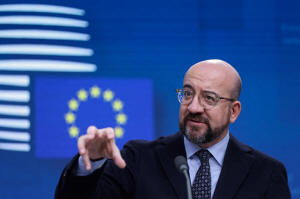EU leaders to discuss using profits from Russian assets to arm Ukraine
 Send a link to a friend
Send a link to a friend
 [March 21, 2024]
By Andrew Gray and Kate Abnett [March 21, 2024]
By Andrew Gray and Kate Abnett
BRUSSELS (Reuters) -European Union leaders will on Thursday discuss a
plan to use billions of euros in profits from frozen Russian financial
assets to buy arms for Ukraine as they try to bolster Kyiv in its fight
against Moscow's invasion.
The bloc's 27 national leaders will also debate how Europe can do more
to defend itself and boost its arms industry, reflecting fears that
Russia may not stop at Ukraine and the U.S. may not be such a staunch
protector of Europe in future.
"For decades, Europe has not invested enough in its security and defence,"
Charles Michel, president of the European Council of EU leaders, wrote
in his invitation letter for the summit.
"Now that we are facing the biggest security threat since the Second
World War, it is high time we take radical and concrete steps to be
defence-ready and put the EU's economy on a 'war footing'."
In a two-day summit in Brussels due to start at 1200 GMT, the EU leaders
will also tackle topics as diverse as the war in Gaza, the prospect of
opening membership talks with Bosnia and farmers' protests.
But Ukraine will top the agenda, with President Volodymyr Zelenskiy
joining the leaders via video link.

EU leaders have voiced increasing alarm about the state of the war in
recent weeks, with ammunition-starved Ukrainian forces struggling to
hold back Russian troops and a $60 billion military aid package for Kyiv
stuck in the U.S. Congress.
The European Commission, the EU's executive body, this week proposed
taking profits from Russian assets frozen in Europe after Moscow's
invasion and transferring some 90% to an EU-run fund used to finance
arms for Kyiv.
The Commission estimated the profits on the assets - various Russian
central bank securities and cash - could be between 2.5 billion euros
($2.73 billion) and 3 billion euros per year.
Russia on Wednesday described the EU plan as banditism and theft.

Belgian Prime Minister Alexander De Croo welcomed the Commission
proposal.
"I think it's a sensible way of doing it. I think the idea to allocate
it predominantly to the purchase of weapons makes total sense," he told
Reuters.
HOW WILL ORBAN REACT?
The assets are frozen by EU central securities depositories, mainly
Belgium's Euroclear. Ukraine would also receive the 25% tax that the
Belgian government puts on the profits.
[to top of second column]
|

European Council President Charles Michel speaks during the European
Union leaders' summit, in Brussels, Belgium December 15, 2023.
REUTERS/Johanna Geron/ File photo

The idea of using the proceeds to benefit Ukraine enjoys broad
support among EU governments, diplomats say. But using the money to
buy weapons is more problematic for some countries.
Much attention will focus on the reaction of Hungarian Prime
Minister Viktor Orban, who maintains closer ties to Moscow than
other EU leaders and opposes sending arms to Ukraine.
The proposal also raises questions for neutral or militarily
non-aligned countries such as Malta, Austria and Ireland.
No final decision is expected at the summit. But leaders will
indicate how the EU should proceed with the proposal.
A draft summit declaration said leaders "reviewed progress" on using
the revenues "for the benefit of Ukraine, including possibly for
funding military support" and asks EU bodies to "take work forward".
'NO TIME TO WAIT'
It also says the EU "is committed to increasing its overall defence
readiness and capabilities to match its needs and ambition" amid
"rising threats and security challenges".
It invites officials to scrutinise a European Commission plan to
boost Europe's arms industry by incentivising EU countries to buy
European, and club together on joint projects.
The leaders are expected to discuss the vexed question of how
greater defence spending should be financed.
French President Emmanuel Macron and others have embraced a proposal
by Estonian Prime Minister Kaja Kallas for European defence bonds.
But other countries, including fiscally cautious Germany, Austria,
the Netherlands and Sweden, are sceptical.
In an interview with Reuters, Kallas argued such borrowing was
needed urgently.
"The crisis is right now, here. We have to invest in defence now,"
she said. "We don't have the time to wait."
($1 = 0.9151 euros)
(Reporting by Andrew Gray, Jan Strupczewski, Kate Abnett, Julia
Payne; Additional reporting by Gabriela Baczynska, Philip Blenkinsop,
John Irish, Nette Noestlinger and Andreas Rinke; Writing by Andrew
Gray and Ingrid Melander; Editing by Lincoln Feast, Alison Williams
and Alex Richardson)
[© 2024 Thomson Reuters. All rights reserved.]This material
may not be published, broadcast, rewritten or redistributed.
Thompson Reuters is solely responsible for this content. |